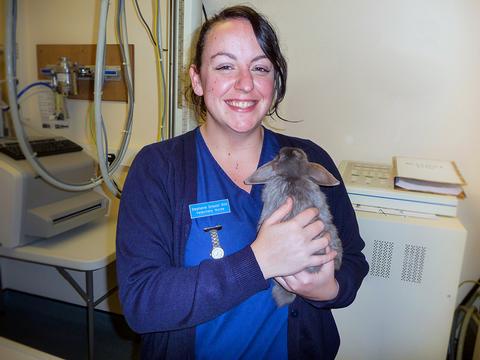Stephanie Driscoll

I am a… head veterinary nurse
You could be a Head Veterinary Nurse (RVN) if you would enjoy:
- Working with a range of animals from pets to farm livestock or zoo animals
- Working closely with a team of vets and RVNs
- Daily nurse consults
- Anaesthesia monitoring
- Theatre work
- Radiography
- Bandaging, blood taking and lab work
- Supervising staff
- Dealing with the public sensitively
- Ordering stock and equipment for the practice
- Dealing with drug sales representatives and deciding which drugs to stock
Finding a job that you look forward to each day is what most of us hope for, and something Stephanie Driscoll is glad to say she has achieved in her role as Head Nurse at Heywood Veterinary Centre in Lancashire. “I was delighted to be offered the role and I love it.” The 25-year-old Registered Veterinary Nurse (RVN) began working at the practice just after finishing her exams, and was promoted within seven months.
Steph is the first to admit that it’s not enough to love working with animals – you have to like people too. “I love the nurse consults, getting to know your clients and the patients and just talking!”
Apart from her duties as an RVN she is also a fully trained clinical coach, which allows her to train veterinary nurse students, including placement students from Harper Adams. Having extra training such as this makes graduates even more attractive to employers: “The practice especially liked the practice management side of my degree. I had an SQP qualification too which I got whilst at university. This stands for Suitably Qualified Person and means you can prescribe certain medications/products that veterinary nurses without this qualification cannot. I am also a chatty person, ideal for nurse consults!”
Having a good degree can also help to attract a bigger salary as well as more responsibility. “I was offered a higher salary for being a degree veterinary nurse, which was increased with clinical coach and SQP qualifications. This again was increased when the head nurse position was offered.”
Steph had already gathered lots of experience during her placement with Abington Park Surgery in Northampton. She says: “I was a Student Veterinary Nurse, completing my portfolio and gaining experience to become a qualified registered veterinary nurse. I worked a range of shifts and saw plenty of exciting emergency cases. It was really useful to see a different veterinary practice, learn other ways to complete tasks and see theory put into practice.”
Taking a Veterinary Nursing degree is certainly worth the investment, Steph feels: “Other non-degree nurses can go to college one day a week and work full time in practice meaning they get a lot of hands on experience, but the placement years means we get chance to have loads of experience in every aspect of the job, and yet are still gaining the degree at the end of the course. Degree nurses have the opportunity to become head nurses and practice managers too.
“The teaching and support from staff at Harper Adams is excellent, especially the veterinary nursing team, and the facilities are superb – it was great getting handling experience within the Companion Animal House.
More from Steph on Harper Adams and her career
Why did you choose to study at Harper Adams?
A great course and the practice management side meant it was more appropriate than other courses at other universities. Gorgeous surroundings and not in a city, which was ideal, nice small campus, nice students.
What were the best things about your course?
Interesting modules, good teachers, plenty of hands on experience as well as sound underpinning of theory in lectures.
Did it improve your career prospects?
Firstly the placement year is invaluable, very sought after when employing a degree veterinary nurse. Also the practice management side of the course meant I could help steer the practice towards better marketing strategies.
Tell us a little about any projects you worked on.
My dissertation was on how passive smoking affected dogs whilst under general anaesthesia. This is very relevant to the real world as passive smoking is a huge issue into which very little research has been carried out. I enjoyed doing the research and I have continued it whilst in practice. It was confirmed that dogs being exposed to passive smoking effects the SpO2 and EtCO2 readings whilst under GA and so these patients carry a higher anaesthetic risk.
And now you are a head nurse?
Yes, I was employed by Heywood Veterinary Centre in June 2010, after seeing the job advertised in the Veterinary Nurse Times, and was offered Head Nurse position in January 2011. I was employed as a clinical coach meaning I can train other veterinary nurse students so firstly I undertook training to get clinical coach status.
What sort of tasks and responsibilities does it involve?
As head nurse I deal with all the ordering for the practice and meet all the drug reps and decide which drugs we stock. As clinical coach I train veterinary nurse students, including a student on placement from Harper Adams! As an RVN (Registered Veterinary Nurse) I do daily nurse consults, anaesthesia monitoring, theatre work, radiography, bandaging, blood taking and lab work. I look after any work experience students we have.
What advice do you have for a student interested in doing a similar job?
Get plenty of experience, get the SQP qualification, be confident and shine in the interview.
What are your favourite memories of being a student?
The nightlife. I loved the nights out at the bar and in Newport. I made some lifelong friends at Harper Adams. I loved studying there and now I have to continue with CPD (continuing professional development) to keep up to date with the constantly changing world of veterinary medicines and techniques.




